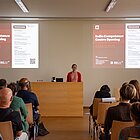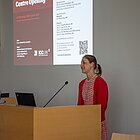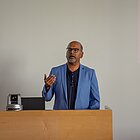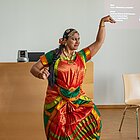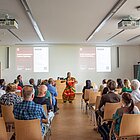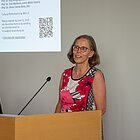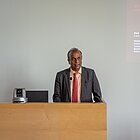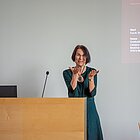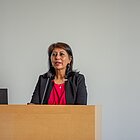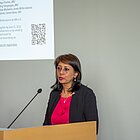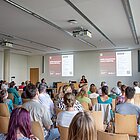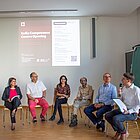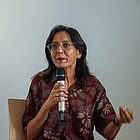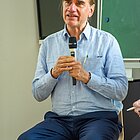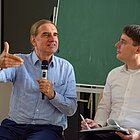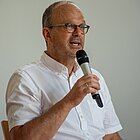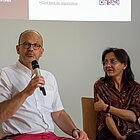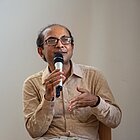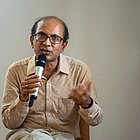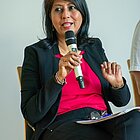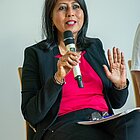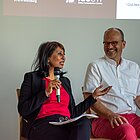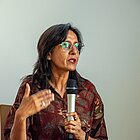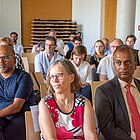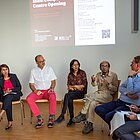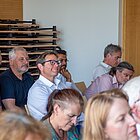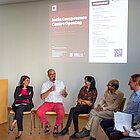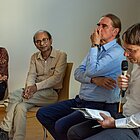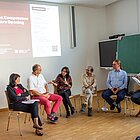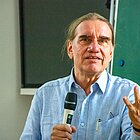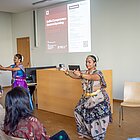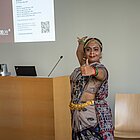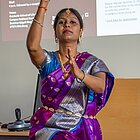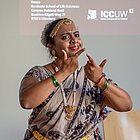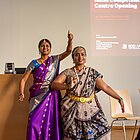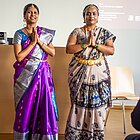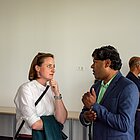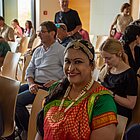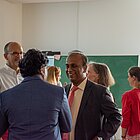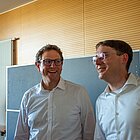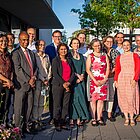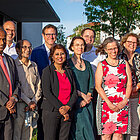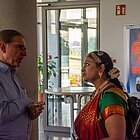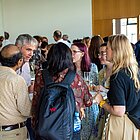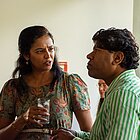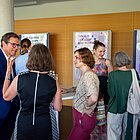India in Focus: New Competence Center at the University
The new India Competence Center at Julius-Maximilians-Universität (JMU) strengthens collaboration with one of the most dynamic countries in the world. It was officially inaugurated on June 26. As a central point of contact for all activities related to India, the new India Competence Centre of the University of Würzburg (ICCUW) promotes interdisciplinary exchange in science and economic, cultural, and political relations between German and Indian research partners. The centre brings together members from several faculties that already have cooperation projects with Indian partners.
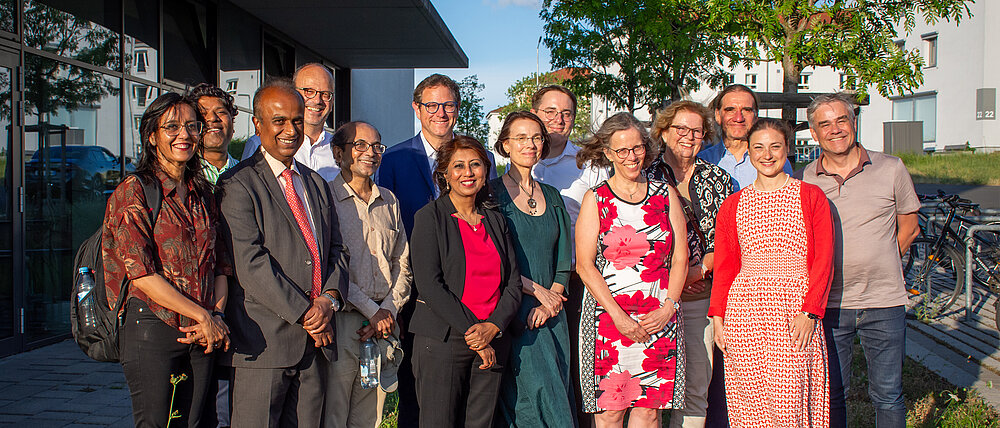
People who are not affiliated with JMU can also contact the centre, revealed the new spokesperson Kathrin Holz, junior professor of Indology, in her welcome speech – a topic that was also close to the heart of Indian Consul General Shri Shatrughna Sinha, who brought with him a donation of literature from the Indian Consulate General in Munich as a starting gift for the ICCUW: He sees the new centre not only as an academic institution, as he emphasized in his welcoming address, but as a living bridge between Germany and India, built and shaped by human contact.
A wide range of tasks for the new center
One of the core tasks of the new India Competence Centre is to document the university's numerous India-related activities and collaborations and make them even more visible both internally and externally. “This not only helps scientists,” said JMU Vice President Professor Doris Fischer. “It also supports JMU's management bodies and service units in maintaining relationships with Indian partners.”
Another important focus is on organizing and helping to shape India-related events and activities at JMU. Cultural, scientific, and social topics related to India are thus integrated into everyday university life and contribute to intercultural openness and multidisciplinary academic dialogue.
In addition, the ICCUW positions itself as a central point of contact for external stakeholders from politics, diplomacy, science, industry, and education. By specifically involving these actors, the center aims to create synergies, strengthen networks, and promote knowledge transfer between the university and society.
New bridges instead of ready-made formulas
In her groundbreaking lecture “Bridging Horizons: Reimagining Europe-India Partnership in a Multipolar World,” Professor Umma Salma Bava from the Centre for European Studies at Jawaharlal Nehru University in New Delhi emphasized the growing importance of German-Indian relations. In view of the current global upheavals in politics, economics, and diplomacy, she said it was more important than ever to strengthen the partnership between Germany, the EU, and India in a targeted manner.
She cited the visit of the EU Commission to India in February 2025 and the planned free trade agreement—a project between the world's two largest democracies that holds great economic and geopolitical potential—as concrete examples.
At the same time, the political scientist, who was awarded the Order of Merit of the Federal Republic of Germany in 2012 for her commitment to German-Indian relations, called for a realistic assessment of international cooperation: “Unlike in chemistry, for example, there are no ready-made formulas for cross-border cooperation.” This makes institutions such as the ICCUW all the more important, as their work builds bridges, facilitates encounters, and promotes intercultural exchange in the long term, Professor Bava emphasized.
Integrating research, teaching, and society
During a panel discussion moderated by Dr. Philipp Gieg, Postdoc at the Chair of International Relations and European Studies, the objectives and priorities of the new centre were examined from an academic and social perspective: Professor Ingo Fischer from the Institute of Physical and Theoretical Chemistry at JMU emphasized the importance of intensive exchange at all academic levels: “Our goal is to connect top researchers from both countries.” At the same time, he sees the ICCUW as a possible basis for future new teaching activities, for example in master's programs.
Professor Simi Malhotra, Director of the Centre for Northeast Asian Studies and Policy Research at Jamia Millia Islamia University in New Delhi, underscored the relevance of personal encounters in international cooperation: “The ICC offers the opportunity to transform virtual mobility – as it takes place today in the form of video conferences – into real, lived mobility.” Her own experiences in a two-year research and teaching cooperation with the English and American Studies department at JMU serve as an example of how valuable such exchange formats can be for deepening scientific partnerships.
Mastering the challenges of scientific work
The challenges of cross-border cooperation were also a focus of the discussion. Professor Jörg Gengnagel, Chair of Indology at the Institute for East and South Asian Cultural Studies at JMU, addressed questions of academic freedom in the respective countries. His remarks made it clear that successful international cooperation depends not only on organizational structures, but also on shared ethical principles in science.
Another central topic of the discussion was the sometimes differing funding guidelines, which can occasionally become stumbling blocks in international cooperation. “Dual funding structures often create dual hurdles,” explained Professor Saugata Bhaduri, Director of the Centre for English Studies at the Faculty of Language, Literature, and Cultural Studies at Jawaharlal Nehru University. In such cases, the new center can provide planning security through consultation.
In order to meet the complex demands of international cooperation, the new center relies on networks and cooperation projects, including partnerships with the Federal Ministry of Education and Research (BMFTR), the German Academic Exchange Service (DAAD), the German Research Foundation (DFG), and the Max Weber Foundation, which promotes German humanities research abroad.
A spirit of optimism
In addition to academic exchange, the program also left room for cultural inspiration: dancers from the Würzburg cultural association Namaste Indian Association delighted the audience with regional Indian dance performances.
The successful cultural impulses, the palpable spirit of optimism and the diverse positive expectations for the new centre were clearly evident among the numerous invited guests, including Martin Heilig, mayor-elect and since July 1, 2025, mayor of the city of Würzburg: “Today, I have experienced great enthusiasm for the connection between Würzburg and India – academically, but also on a very personal and emotional level,” he concluded.
The festive and diverse opening of the ICCUW offered a foretaste of the roles that the centre can play at JMU in the future: a platform for multifaceted encounters and experiences in academic exchange, as well as a lively meeting place where connections grow, ideas emerge, and diversity finds its place in research and society.
Text: Jörg Fuchs
Photos: Larissa Köhler


